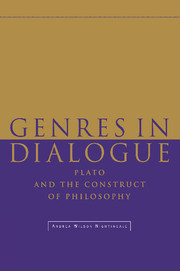Book contents
- Frontmatter
- Contents
- Acknowledgments
- Abbreviations and texts
- Introduction
- 1 Plato, Isocrates, and the property of philosophy
- 2 Use and abuse of Athenian tragedy
- 3 Eulogy, irony, parody
- 4 Alien and authentic discourse
- 5 Philosophy and comedy
- Conclusion
- Bibliography
- General index
- Index of passages from Plato
5 - Philosophy and comedy
Published online by Cambridge University Press: 23 October 2009
- Frontmatter
- Contents
- Acknowledgments
- Abbreviations and texts
- Introduction
- 1 Plato, Isocrates, and the property of philosophy
- 2 Use and abuse of Athenian tragedy
- 3 Eulogy, irony, parody
- 4 Alien and authentic discourse
- 5 Philosophy and comedy
- Conclusion
- Bibliography
- General index
- Index of passages from Plato
Summary
The people who throng the streets shout at each other, their voices rising from the mass of heads and floating upwards towards the church spires and the great copper bells that clang at the end of the day. Their words, rising up, form a thick cloud over the city, which every so often must be thoroughly cleansed of too much language. Men and women in balloons fly up from the main square and, armed with mops and scrubbing brushes, do battle with the canopy of words trapped under the sun.
The words resist erasure. The oldest and most stubborn form a thick crust of chattering rage.
Jeanette Winterson, Sexing the CherryScatology and eschatology: at first glance, Attic comedy seems completely removed from the discourse of philosophy. But while Plato shows a serious aversion to laughter (see, e.g., Rep. 388e), he is arguably more indebted to comedy than to any other literary genre. It is in comedy, of course, where Socrates gets his start as a literary character. As Diskin Clay has suggested, “Socrates kōmōidopoioumenos is … significant for the history of the Sōkratikoi logoi as they are to be placed in the context of ancient literary genres.” But how exactly does comedy impact upon the Platonic dialogue? In Plato's Apology, Socrates mentions the comic playwrights as being among his “first accusers” (18a–e). We might expect, then, that Plato would be consistently hostile to the genre of comedy, since it made his own hero into a ridiculous buffoon.
- Type
- Chapter
- Information
- Genres in DialoguePlato and the Construct of Philosophy, pp. 172 - 192Publisher: Cambridge University PressPrint publication year: 1995

